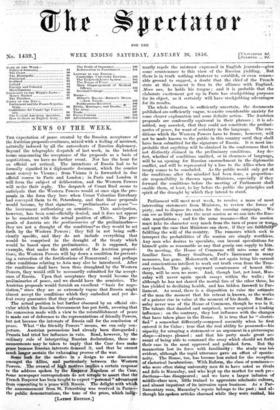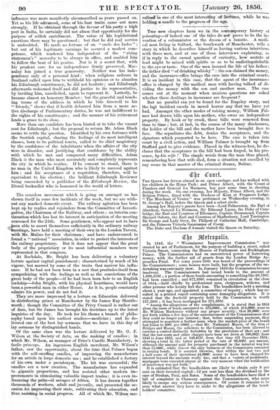Parliament will meet next week, to receive a mass of
most interesting statements from Ministers, to review the forces of party, and to dispose its ranks for the ensuing campaign. • We can see as little way into the next session as we can into the Rus- sian negotiations ; and for the same reasons—that the session must take its character very much from the turn of peace or warts, and upon the ease that Ministers can show, if they are faithfultr fulfilling the will of the eou:ntry. The- rumours which seek to interpret the probabilities of the session are simply worthless. Any man who desires to speculate, can invent speculations for himself quite as reasonable as any that gossip can supply to him.
On meeting, the House of Commons will miss some of the familiar faces. Henry Goulburn Peel's lieutenant in many measures, has gone. Molesworth will not again bring his earnest and conscientious intellect to work out truth even from the Trea- sury-bench. The pale, wayward countenance of honest Sib- thorp, will be seen no more. And, though last, not least, MaC- aulay will never- again speak essays within the walls ; for although he has not shared the mortal fate of the other three, he has yielded to declining health, and has bidden farewell to Par- liament. As usual, there is a disposition to raise the' estimate of the man the moment that his retreat is known, as the works of a painter rise in value at the moment of his death. But Mac- aulay never was of the House .of Commons, though he was in it. The talents that dazzled and surprised, never acquired a leading influence ; on the contrary, they lost influence with the changes that have taken place in the House. It is true that he " electri- fied " a somewhat differently-composed assembly when he first entered it for Caine; true that the real ability he possessed—his eapacity1 for arraying a statement or an argument in a picturesque shape—always pleased ; and that his party made great ac- count of being able to command the essay which should set forth their case in the most approved and polished form. But the mannerism lost its force with familiarity ; the study was too evident, although the rapid utterance gave an effect of sponta- neity. The House, too, has become less suited for the reception of rhetorical lacubrations. With Reform, the class of nominees-- who were often rising university men fit to have acted as rivals and foils to Macaulay, and who kept up the market for such prc- duetiona—has disappeared ; and we have a larger infusion of middle-class men, little trained to appreciate scholastic culture, and almost impatient of its intrusion upon business. Ai a Par- liamentary man, Macaulay's repute belongs to the past ; and al- though his spoken articles charmed while they were recited, his influence was more manifestly eircumseribed as years passed on. Yet as his life advanced, some of his best traits came out more strongly. If he obtained through the favour of his party a high post in India, he certainly did not abuse that opportunity for the purpose of selfish enrichment. The value of his legislational exertions there may be questioned ; but that he did real service is undoubted. He made no fortune of an " oncle des Lides " ; but out of his legitimate earnings he secured a modest com- petence, which rendered him independent of the "rising statesman's" necessity to be always in office, and enabled him to follow the bent of his genius. Nor is it a secret that, with his prudent care for an independence firmly preserved, Mac- aulay has joined a true generosity. Neither was his inde- pendence only of a personal kind : when religious ardours in Scotland called upon him to withhold his opinions or to abandon his Edinburgh constituency, he did not hesitate ; and Edinburgh afterwards redeemed itself and did justice to its representative, by inviting him, unsolicited, again to represent it. Latterly, he became almost an honorary Member : but the graceful and touch- ing terms of the address in which he bids farewell to his "friends," shows that if health debarred him from a more ac- tive discharge of Parliamentary duties, he was not indifferent to the rights of his constituents ; and the manner of his retirement lends a grace to its close.
More than one candidate has been hinted at to take the vacant seat for Edinburgh ; but the proposal to return Mr. Adam Black seems to settle the question. Identified by his own fortunes with the Scottish capital, sharing the feelings of its most intelligent classes, born to its political tenets, called to its chief magistracy by the confidence of the inhabitants when the affairs of the city were in disorder, and justifying that confidence by the ability with which he met and conquered many difficulties, Adam Black is the man who most accurately and completely represents the city in which he resides. If he consent to stand, there is no man in the United Kingdom who is likely to succeed against him ; and his acceptance of a requisition, therefore, will be equivalent to his election ; the brilliant Edinburgh Reviewer being succeeded by a publisher of the Edinburgh Review, the liberal bookseller who is honoured in the world of letters.



























